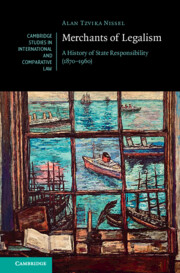Book contents
- Merchants of Legalism
- Cambridge Studies in International and Comparative Law: 190
- Merchants of Legalism
- Copyright page
- Dedication
- Epigraph
- Contents
- Acknowledgments
- Prologue
- 1 The Responsibilities of States in International Law
- 2 The US Turn to the Technique of International Arbitration
- 3 The Creation of State Responsibility in the New World
- 4 International Responsibility as German Philosophy
- 5 State Responsibility as World Order
- Epilogue
- Bibliography
- Index
- Cambridge Studies in International and Comparative Law
4 - International Responsibility as German Philosophy
Published online by Cambridge University Press: 19 December 2024
- Merchants of Legalism
- Cambridge Studies in International and Comparative Law: 190
- Merchants of Legalism
- Copyright page
- Dedication
- Epigraph
- Contents
- Acknowledgments
- Prologue
- 1 The Responsibilities of States in International Law
- 2 The US Turn to the Technique of International Arbitration
- 3 The Creation of State Responsibility in the New World
- 4 International Responsibility as German Philosophy
- 5 State Responsibility as World Order
- Epilogue
- Bibliography
- Index
- Cambridge Studies in International and Comparative Law
Summary
It is no coincidence that the modern doctrine of state responsibility bares close resemblance to German public law. In addition to the US–led practice of international arbitration, another early source of state responsibility was the German theorization of international law. German lawyers were grappling with the growing political power of the state and sought to relate these political realities to legal norms. These lawyers were not concerned with alien protection in particular, but with state power in general. They looked at state responsibility through a wide lens – that is, as it relates to the violation of any international obligation. The trajectory of state responsibility within German theory shows a pattern: as the German approach to statehood became abstracted from monarchical conceptions, the idea of responsibility became increasingly possible and robust. These streams of thought shared an assumption about philosophy’s vital role (and arbitration’s minor part) in constructing and legitimating state responsibility.
Keywords
- Type
- Chapter
- Information
- Merchants of LegalismA History of State Responsibility (1870–1960), pp. 185 - 247Publisher: Cambridge University PressPrint publication year: 2024

